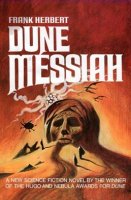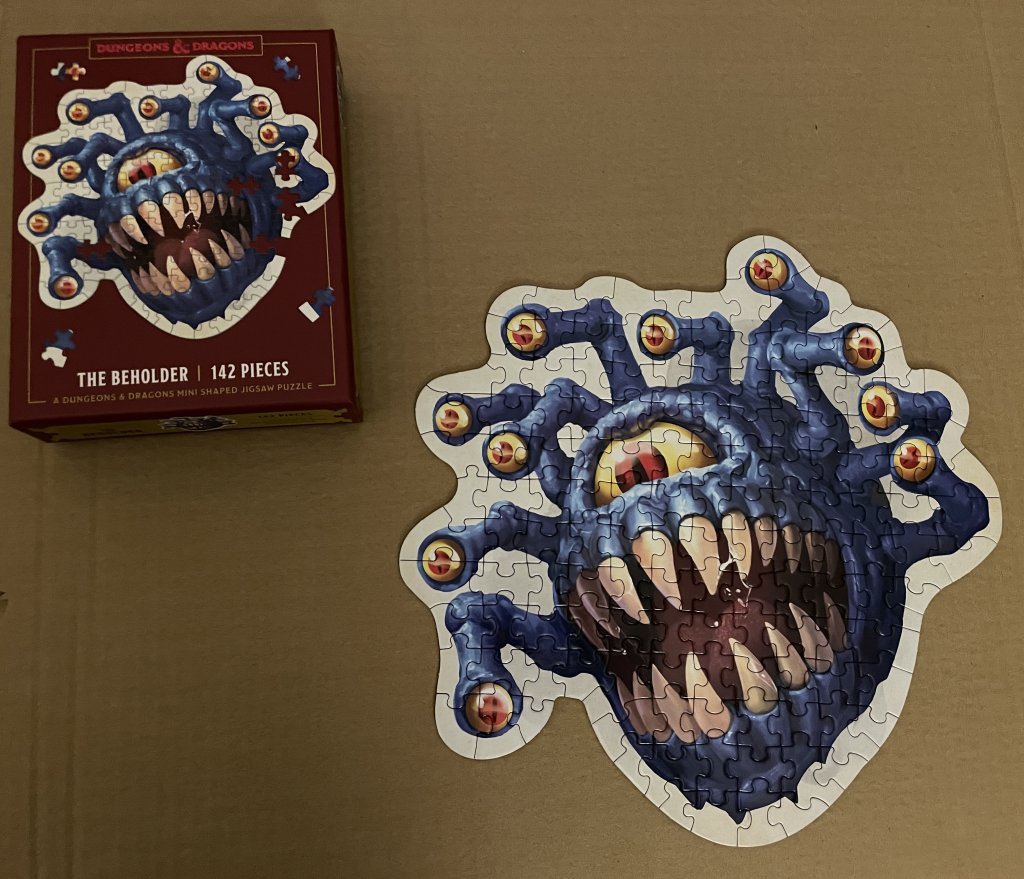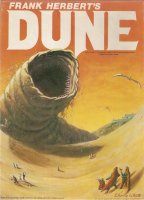Book review: Dune Messiah

Book: Frank Herbert's Dune Messiah
The first Dune book got me even more interested in Frank Herbert's universe, so I had to keep reading. I recently finished the second physical title (according to the "internal" numeration, it would be the fourth book), so here comes a small review.
Again, the first half of the book was very slow-paced. There are many moving pieces, at times unclear exactly to what purpose, and very detailed conversations and explanations of the state of things (12 years have passed since the first book's events). But then, everything begins to connect; events, plots, and characters advance.
It is a different book, not a mere continuation. The main character, Paul, feels tormented by his foresight; his close friends doubt him, and people question his decisions or directly conspire against him. And some new characters are disturbing, specially the "gholas", clones of deceased humans with metallic eyes and reprogrammed memory (but recalling most of their past).
You won't find here the same positive and encouraging story of the rising of a hero against oppressors. But it gets fascinating, with a thrilling "last act" finishing with an ending that makes you want more.
Tags: Books
Dungeons & Dragons Beholder Jigsaw Puzzle
I had in mind posting a book review, but instead prefer to first share a photo of a recent new hobby, doing jigsaw puzzles... but not due to their complexity, instead based on the illustration. The first one was pretty low on pieces count (not even 150!), but I loved the image and couldn't resist. Behold, a Dungeons & Dragons Beholder!

Next will be a 1000 pieces puzzle based on the Zelda videogame series, but I also plan to paint a Wizkids DnD Beholder miniature with the same color schema. We'll see which one I finish first.
Tags: DnD
Book review: Dune

Book: Frank Herbert's Dune
Dune is a science fiction story set in a distant future where noble houses rule different planets, alongside an Emperor and his elite Sardaukar troops, and a powerful trading guild that controls space travel. The plot follows a young Paul Atreides and his family as they take charge of Arrakis, a desert planet that is the only source of a valuable substance called melange or 'spice'. The spice extends life and enhances mental abilities, and it is crucial for space travel. The Atreides arrive to Arrakis to control it by the Emperor's orders, but things won't be as easy. The story explores complex themes of politics, religion, ecology, technology, and human emotions as different factions in the empire clash over control of the planet and its invaluable spice.
Yet another timeless classic that I had pending and decided to go for. In this case, even more so because Dune 2 is one of my all time favourite videogames, so I felt I had a pending debt to settle. And I like both the old and new movies, so needed to see the source of it all.
I've enjoyed the book so much so as to plan to keep reading at least one more book (potentially until God Emperor of Dune, included). I knew it was good but didn't expected to hook me in so much. At times it felt like The Lord of The Rings, providing long and detailed descriptions of seemingly trivial characters, scenarios and details. Then, the "characters thinking" technique (you read what they think at times, not only what they say) is different and interesting, providing with additional details and more insight on how and why different characters act the way they do.
It is also different from what I expected: The scarce technology (the Ornithopters, meelee shields, spice harvesters, and some "laser weapons", but not much more) was a surprise to me; In the strategy videogame there are tons of vehicles, troops with different long range weapons, but in the book fuel is scarce and vehicles at times deteriorated, combats are mostly melee, and in general everything feels not as futuristic as you'd imagine. Reading at Wikipedia I saw that the author wanted to replicate a feudalism-like setting, much more focused on the human and politics side of things, and it is clearly there.
The only thing that I can complain about is that the pacing begins very slow, but speeds up and actually jumps ahead years by the end (few, but still), giving the sensation that you missed something in the middle. It is a long book, and yet I expected more things to happen in the kind of "final story arc", instead being a bit short. But maybe was just me wanting to read more about the intriguing Fremen, the Shai-hulud, and Arrakis itself.
A sci-fi must read.
Tags: Books
Status Update: September 2023
Finished
Zelda: Tears of the Kingdom
By far, my game of the year. Such an incredible game, with so many mechanics, at first a bit too similar to Tears of the Kingdom, but soon you notice all the new and improved mechanics, and details, and new maps, and the myriad of weapon combinations, and vehicle building... It's huge, really huge.
Also, is a game you enjoy more without spoilers, simply arriving from having played Zelda BOTW [1] and continuing the story. You'll naturally learn all the new things along the way. After all, this is Nintendo, and they are the masters of guiding players and smoothing the learning curves (while keeping a high peak!).
I picked the official game guide just to have a big checklist of all the things I want to do. Because the numbers are staggering: 3 maps, dozens of main quests, combined hundreds of side-quests + side-adventures + shrine-quests + similar, 152 shrines, 1000 koroks (collectible the golden poo-like objects)... I finished the game at around 90 gameplay hours, with ~90 shrines done. At the time of writing this post, I'm at 112 shrines and +110 hours, and lots of things to do and secondary quests to finish. It is immense.
Diablo IV
Sadly, my disappointment of the year. I was expecting more Diablo III, maybe with a fair amount of repetition, but also quasi-endless replayability. Instead, what we got was a game that sits in between an MMORPG and Diablo III, kind of picking the worst of both. The lack of random dungeons or enemies (each map zone and dungeon has fixed enemy types), combined with a significant amount of required grinding and a semi-broken difficulty level system [2], makes the game boring once you pass the story and reach around level 60 or so.
I said that I could probably play this title for years. Well, after just two months, I instead got too tired, and felt that the Seasonal system is really badly implemented (lots of grinding with almost no new mechanics, and really bad "free" rewards). And I've noticed that either you endlessly play nightmare dungeons (remember, no randomness, so always the same bosses and enemies and maps) or you just stop playing. So I chose to do the later until an expansion or significant patch comes out.
Ongoing
Starfield
I had high hopes for this one, but I was reluctant to pre-order it without having seen the final result. I'm happy for not having picked any fancy edition, but I am playing it, and I feel... kind of sad.
It feels like a good game, but nowhere what the hype sold us about an amazing space adventure. Starfield feels more like "Fallout 4 in space". Same mechanics, some additions (like space-combat), different setting... but still clearly an improved version of the same engine, and at times too familiar to Fallout or Elder Scrolls players. Also, some of the new systems or changes to existing ones feel quite patchy:
- Ammo does not weight, but most other things do, and containers have "limited weight space", so you'll just drop stuff around your ship/house
- Quite a few skills look exactly like a sci-fi Fallout 4/Skyrim, and some are mostly just locks behind crafting different stuff. Plus topics like lock-picing is even more tiring this time (puzzles to solve each time? really?)
- NPCs are cool at first, but the eyes are too bright, sometimes the face gestures look weird, and crowd-NPCs are way simpler than the ones you're expected to interact with. Plus some dialogs trigger incorrectly, or repeatedly, breaking the moment
- You'll miss lots of tutorials on how to do things: It took me 10 minutes to find the "storage" in my ship (hint: near the driver seat, and there are actually two of them, one in front of the other); I can equip boost packs, but can't boost until I unlock the boost perk... and is just double jumping; Advanced lock-picking perks are confusing (and one feels useless); I had to search online to learn that I cannot be alone, and will always have a companion, which at the beginning means no sneaking/stealth because you go questing with a big noisy and chatty robot at your side
- The graphics look great at times, and just a beefed up Fallout 4 other times. I feel we were shown videos and demos very carefully selected to showcase the cool parts, while hiding that the game feels so similar to previous Bethesda titles. Plus requires a beefy graphics card
- Too many loading screens, and all the exploration and space flight part feels like a poor copy of No Man's Sky. I expected smoothly going from the planet surface to space, then flying to my desired planet. Instead, you get to hold a key, watch a cinematic, open terribly-designed menus to pick a destination, hold another key and watch another cinematic. Did somebody really thought this is a cool and immersive experience, that you are supposed to hundreds of times? To me, it feels more like the game engine couldn't do better, so they just pushed in the new space sub-system, glued together with loading screens, and decided to force you to use menus and fast travel
- I'm already using more than half a dozen mods just to fix or improve things: color exposure, flashlight radius, NPC eyes, a better UI for the inventory (terrible by default on PC)... To me, this is a sign that things were not fully refined and playtested, just hurried away to focus on other more pressing topics
In any case, I might try to at least finish the main quest storyline, but this is a game that needs months of patching and community mods to aspire of becoming "great".
Dragon Age: Origins
At first while waiting for Starfield, and now mostly because of it, I decided to begin with the Dragon Age trilogy. I had played a few hours before, but long ago, so I restarted. At times I remember too well what's going to happen, but I hope to reach the point where I left it (which I don't even remember exactly!).
Anyway, it's a nice Bioware-syle game, my beloved Star Wars: KOTOR system with a fantasy setting. Graphically begins to feel very outdated, but the writing/dialog is soo good; It is so fun to listen the conversations between the party members (often they don't think alike, and just tag along because of you), entertaining to solve some quests in different ways (this is a game where persuasion/intimidation opens new choices), and the story so far is a bit typical and kind of predictable, but good enough to make you push forward, and a good excuse to allow you to solve situations in different ways (including malevolent and violent ones).
[1] Although I recommend not playing both just one after the other. Take your time, because TOTK requires a lot time.
[2] At least with some classes, you'll transition from being under-powered to over-powered in the current tier quickly, but then need to rely on Nightmare Dungeons to level up decently and improve gear, until you can properly play in the next tier. I soloed the Tier 4 unlock dungeon at level 66, but Tier 4 enemies are level 75+, so until I reached level 70 couldn't even fight normal enemies.
Tags: Videogames
Status Update: July 2023
Again no painting nor boardgaming.
I planned to buy Games Workshop's Lion El'Jonson primarch miniature, but their greed made it impossible, by only offering a limited edition (with some extra minis) that went away as soon as it went online. So I'll wait until the normal edition comes out, whenever that happens (GW an amazing company but at times totally careless about their customers).
Let's go on with the video gaming updates:
Finished
Hand of Fate
To be honest, I finished this title a while ago, but decided to play it a bit more before starting with the second part (whith I put on hold, for various reasons).
It is a small gem: A roguelite that is partly a "choose your adventure" game, partly a card game, with a big amount of luck/randomness, and bits of arcade when you fight enemies and bosses. The premise is that you are a warrior that will play a very dangerous game with a "dungeon master", having all sorts of adventures, choices to make, and dying (a lot), all meanwhile you unlock better cards to potentially use in your next attempt.
It can get a bit repetitive at the end, when you've unlocked most cards and basically depend on luck and some bits of strategy to reach the last levels not only alive but well equipped, but the storytelling, the voice acting, and the atmosphere is awesome.
Warhammer: Chaosbane
Meanwhile I waited for Diablo IV, I picked up some similar action RPGs with isometric view, and Chaosbane was the first one I went with. While not terrible, you will soon notice the medium-budget aura. Mechanics are not too varied (a few feel half-done/unfinished), maps are very repetitive, and in general there's not much incentive to play it once you finish the campaign once, because you will face almost the same content, with no randomness.
Still, if picked in some sale is fun for a few hours.
Wolcen
Another action-RPG, this one with more budget than Chaosbane (but still not a Triple-A title). Wolcen is... a bit disappointing. It begins nicely, but has too many ups and downs: in the story, in the gameplay, in the graphics (why some characters are so taller that you feel puny?)... It is not bad per-se, and I mostly enjoyed going through the campaign. But instead of keeping and keeping playing, even with some curious end-game rogue-lite mechanics, I "shelved it" as soon as I finished, wanting to move on to another game.
Again, good if picked in a sale.
Diablo IV
Diablo is back. When I write a bit below about the only title I have in progress, I can only say that I was happy that Zelda TOTK was released a few weeks earlier than Diablo 4; That way, I could enjoy both, as now Diablo is eating most of my free time.
While to me feels way better than Diablo 2, and in some mechanics also than Diablo 3, D3 is still a superior and more polished title. D4 feels... rushed out. The campaign is a bit too long, with some fragments a bit boring (while others are great), the game has been transitioned to a kind of lite-MMORPG, with tons of very similar side quests and an open-world map at times repetitive...
But my biggest issue is the voice acting: Diablo titles never had the best voice acting outside the main characters, but in D4, it feels like they spent most of the budget in Lorath, Lilith and a few other voices, and 90% of the remaining ones have quite noticeable accents, giving the game a feeling of being lower budget than it really is.
As usual also with all the series titles, except maybe the first one, male characters excepting the Barbarian are "too emo" or ugly, so after levelling a male sorcerer to 52, I decided to start again with a female necromancer (drow-like appearance, really cool).
By the time of this writing, I've already finished twice the campaign and I'm enjoying the "end game" content (where really most of the content resides, except videos!). We'll see how the seasons work, and how Blizzard updates with some free content, apart from confirmed paid expansions, but the loot formula is there and working wonders (most of my friends are also playing it).
Considering that I put hundreds of hours in Diablo 3, plus some unmeasured (but not small) amount in the first two titles, looks like a game I'll be playing for years.
Ongoing
Zelda: Tears of the kingdom
Although I haven't finished it yet, after more than 70 hours of gameplay, in my eyes the new Zelda is the game of the year for 2023.
"Bigger, faster, better" is the TL;DR. Same world, but with notable changes. Same 3D engine, but pushed this time to the limits of the Nintendo Switch. Similar familiarity if you have played Breath of the Wild, but new at the same time...
I won't spoil anything about the game, other than it begins just a bit after where BOTW ended, that the new magic abilities are between cool and amazing (the ultrahand/"glue" is simply mind-blowing), and that now the game has three maps: air, land and underworld.
If you want to know more go and check some review, or watch one of the official trailers, but if you have a Switch, this is an even more must-have title than Zelda: BOTW was.
See you back once I'm done with Hyrule (and more Sanctuary)!
Tags: Videogames